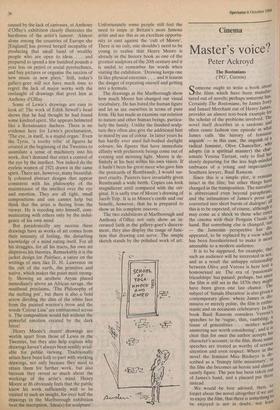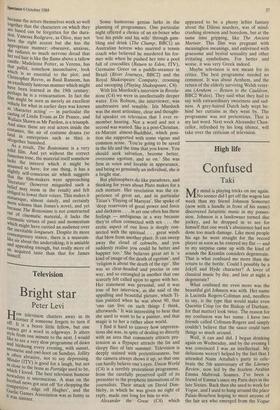Cinema
Master's voice?
Peter Ackroyd
The Bostonians (PG', Curzon) Someone ought to write a book about the films which have been manufac- tured out of novels; perhaps someone has. Certainly The Bostonians, by James IvarY and Ismael Merchant out of Henry James, provides an almost text-book example for the scholar of the problems involved. The, novel itself describes in a sardonic an often comic fashion one episode in what James calls 'the history of feminine anguish' — in this case, the anguish of a radical feminist, Olive Chancellor, Who adopts (in a spiritual manner) the char- ismatic Verena Tarrant, only to find her, slowly departing for the less high-minde° embraces of a young and impecunious Southern lawyer, Basil Ransom. Since this is a simple plot, it remains intact in the film; but other things have changed in the transposition. The narrative is abbreviated even beyond paraphrase, and the intimations of James's prose are converted into short bursts of dialogue; a!I this is to be expected, of course, although it may come as a shock to those who enter the cinema with their Penguin Classic in hand. But something else is changed, to°. — the Jamesian perspective has tits" appeared, to be replaced by a view which has been foreshortened to make it more amenable to a modern audience. It is to be supposed, for example, that such an audience will be interested in seX. and as a result the unhappy relationshiP between Olive and .Verena is here lent a homosexual air. The era of 'passionate friendships' has passed, perhaps, but since the film is still set in the 1870s they might have been given one last chance. The subject of 'female liberation' is also givefl a contemporary gloss: where James is dis- missive or merely polite, the film is enthu- siastic and on occasions celebratory. In the book Basil Ransom considers Verena s speeches to be 'vague, thin, rambling, a tissue of generalities . . . neither
wort
answering nor worth considering', and it is clear that for once the author accepts his character's account; in the film, those same speeches are treated as worthy of serious attention and even respect. Where in the novel the feminist Miss Birdseye is de scribed as a 'frumpy little missionary', 111. the film she becomes an heroic and almost'
h
saintly figure. The pen has been taken out of James's hand, and a placard put there instead. We would be best advised, then, r° forget about the novel altogether if we are to enjoy the film, that there is something to be enjoyed is not in doubt, not least because the actors themselves work so well together that the characters on which they are based can be forgotten for the dura- tion. Vanessa Redgrave, as Olive, may not have the right accent but she has the appropriate manner: obsessive, anxious, she radiates so much nervous dread that her red hair is like the flame above a tallow candle. Madeleine Potter, as Verena, has that pallid, somehow inconclusive, look Which is so essential to the plot; and Christopher Reeve, as Basil Ransom, has an excellently lustrous manner which might have been learned in the 19th century: Perhaps he is a reincarnation. In fact the film might be seen as merely an excellent vehicle for what in earlier days was known as 'character acting' — in particular the casting of Linda Evans as Dr Prance, and Wallace Shawn as Mr Pardon, is a triumph. And since these are real actors inside the costumes, the air of costume drama (so fatal in enterprises such as this) is altogether banished. As a result, The Bostonians is a very solid film.
And yet without the correct
Jamesian tone, the material itself somehow lacks the interest which it might be assumed to have; for one thing, it has a slightly self-conscious air which suggests that the film-makers were approaching literature (however misguided such a belief may seem in the result) and felt Obliged to lower their voices. This makes it statuesque, almost stately, and certainly ,_more solemn than James's novel; and yet because The Bostonians is not constructed out of cinematic material, it lacks the cinematic virtues of pace and momentum Which might have carried an audience over the inevitable longueurs. Despite its more eontemporary stance, there is a museum- like air about the undertaking; it is amiable and appealing enough, but really more of
an acquired taste than that for James himself.















































 Previous page
Previous page